News
Great History Books of 2015 (Part 2)
Posted on January 28, 2016
This is a continuation of an earlier post Great History Books of 2015 (Part 1).
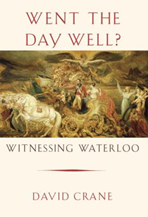 Went the Day Well?: Witnessing Waterloo
Went the Day Well?: Witnessing Waterloo
by David Crane
Went the Day Well? offers a highly original view of Waterloo, grand in scope but meticulous in detail. What was Britain doing on that Sunday, from the mad king downward? Who were born to live out their lives in the Britain created at Waterloo? Who died? Who was preaching, who was writing and who was painting? Lyrically rendered in Crane’s signature prose style, Went the Day Well? Freeze-frames the men and women of Britain in 1815 as they went about their business, attended lectures, worked in fields and factories,-all on the cusp of a new, unforeseeable age.
 1920: The Year That Made the Decade Roar
1920: The Year That Made the Decade Roar
by Eric Burns
“The Roaring Twenties” is the only decade in American history with a widely applied nickname, and our collective fascination with this era continues. But how did this surge of innovation and cultural milestones emerge out of the ashes of The Great War? Burns sets the record straight about this most misunderstood and iconic of periods. From prohibition to immigration, the birth of jazz, the rise of expatriate literature, and the original Ponzi scheme, 1920 was truly a year like no other.
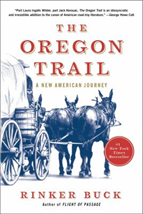 The Oregon Trail: A New American Journey
The Oregon Trail: A New American Journey
by Rinker Buck
An epic account of traveling the length of the Oregon Trail the old-fashioned way-in a covered wagon with a team of mules, an audacious journey that hasn’t been attempted in a century-which also chronicles the rich history of the trail, the people who made the migration, and its significance to the country. Spanning two thousand miles and traversing six states from Missouri to the Pacific coast, the Oregon Trail is the route that made America.
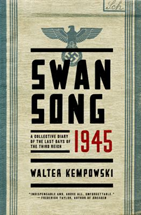 Swansong 1945: A Collective Diary of the Last Days of the Third Reich
Swansong 1945: A Collective Diary of the Last Days of the Third Reich
by Walter Kempowski, Shaun Whiteside, (Translator)
Swansong 1945 chronicles the end of Nazi Germany and World War II in Europe through hundreds of letters, diaries, and autobiographical accounts covering four days that fateful spring: Hitler’s birthday on April 20, American and Soviet troops meeting at the Elbe on April 25, Hitler’s suicide on April 30, and finally the German surrender on May 8. Side by side, we encounter vivid, first-person accounts of civilians, soldiers, POWs, concentration-camp survivors and high ranking figures such as Eisenhower, Churchill, Stalin, Joseph Goebbels, and Hitler himself.
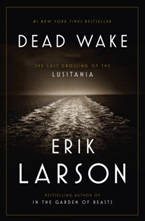 Dead Wake: The Last Crossing of the Lusitania
Dead Wake: The Last Crossing of the Lusitania
by Erik Larson
The enthralling story of the sinking of the Lusitania On May 1, 1915. It is a story that many of us think we know but don’t, and Erik Larson tells it thrillingly, switching between hunter and hunted while painting a larger portrait of America at the height of the Progressive Era. Full of glamour and suspense, Dead Wake brings to life a cast of evocative characters, from famed Boston bookseller Charles Lauriat to pioneering female architect Theodate Pope to President Woodrow Wilson, a man lost to grief, dreading the widening war. A disaster whose intimate details and true meaning have long been obscured by history.
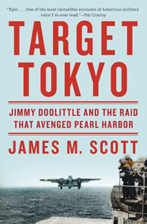 Target Tokyo: Jimmy Doolittle and the Raid That Avenged Pearl Harbor
Target Tokyo: Jimmy Doolittle and the Raid That Avenged Pearl Harbor
by James M. Scott
In December 1941, as American forces tallied the dead at Pearl Harbor, President Franklin Roosevelt gathered with his senior military counselors to plan an ambitious counterstrike against the heart of the Japanese Empire: Tokyo. Four months later, on April 18, 1942, sixteen U.S. Army bombers under the command of daredevil pilot Jimmy Doolittle lifted off from the deck of the USS Hornet on a one-way mission to pummel the enemy’s factories, refineries, and dockyards and then escape to Free China. Based on scores of never-before-published Target Tokyo is World War II history of the highest order.
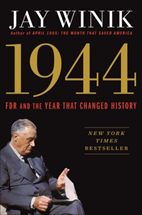 1944: FDR and the Year That Changed History
1944: FDR and the Year That Changed History
by Jay Winik
Winik brings to life the year 1944, which determined the outcome of World War II and put more pressure than any other on an ailing yet determined President Roosevelt. It was not inevitable that World War II would end as it did, or that it would even end well. 1944 was a year that could have stymied the Allies and cemented Hitler’s waning power. Instead, it saved the democracies, but with a fateful cost. A stunningly fresh look at the twentieth century’s most pivotal year.
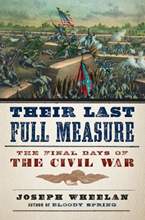 Their Last Full Measure: The Final Days of the Civil War
Their Last Full Measure: The Final Days of the Civil War
by Joseph Wheelan
From the battles ending the Petersburg siege and forcing Lee’s surrender at Appomattox to the destruction of South Carolina’s capital, the assassination of Lincoln, and the intensive manhunt for his killer, Wheelan looks at the dramatic events which ended the war. The fast-paced narrative braids the disparate events into a compelling account that includes powerful armies; leaders civil and military, flawed and splendid; and ordinary people, black and white, struggling to survive in the war’s wreckage.









